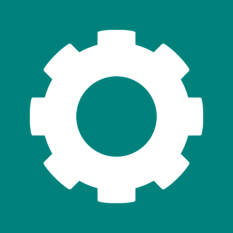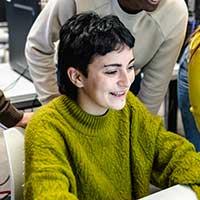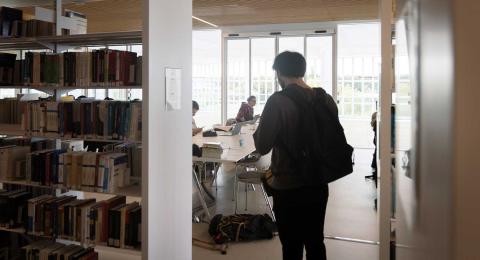The master's program provides an in-depth understanding of research and development in modeling, simulation, and system design, equipping students for one of the following specialties: eXtended Reality and Digital Transformation, Robotics and Production Systems, or Management of Aircraft Maintenance Operations.
The first semester consists of a core curriculum (85%) that includes mandatory subjects related to engineering training (Project and English), design engineering, and production organization and management, divided into three groups of learning units (UEs). A fourth group of UEs, worth 4 ECTS (15%), is offered to students (1 option to choose from 4). The second semester features a first group of 18 ECTS mandatory UEs, followed by 3 groups of elective UEs, each worth 4 ECTS. The distribution of teaching is 33% core curriculum and 67% for electives. All subjects are organized around lectures, tutorials, and practical work. Assessments are conducted through continuous evaluation (practical work, projects, study papers) as well as through examinations.
Information
Skills
- Identify and characterize a design or improvement problem of a complex system.
- Implement advanced and specialized uses of digital tools.
- Mobilize and produce highly specialized knowledge.
- Execute specialized communication for knowledge transfer.
- Contribute to transformation in a professional context.
- Conduct engineering for a complex system.
- Manage a project in complex systems engineering.
Objectives
The objectives of the M1 ISC-Industry track aim to train executives and engineers to improve industrial performance through a multidisciplinary approach: electrical engineering, computer science, mechanical engineering, and industrial engineering. The master's program equips students with the knowledge and skills in research and development for the modeling, design, and management of complex artificial systems, particularly industrial ones. In the M1 Industry track, students follow core subjects as well as specific subjects related to their desired specialization in alignment with their targeted Master 2.
In the first semester, there is 85% core curriculum (industry track) and 15% electives. In the second semester, the teaching is distributed with 33% core curriculum (industry track) and 67% specialization. The M1 courses allow students to acquire scientific and technical foundations in various fields, providing the necessary prerequisites for entry into M2. Among these skills are systems engineering, sizing and simulation, organization and management of business data, and design and innovation methodology. They choose additional courses that enable them to gain skills in line with the targeted majors in M2, with one course in the first semester and three in the second semester. They undertake a project that includes research and a bibliographic synthesis, functional analysis of the project, and the establishment of its specifications. Students must also develop the technical planning of their project (breaking it down into tasks and subtasks, scheduling, and establishing a collaborative co-design policy).
In the second semester, the project transitions into a realization phase. They acquire the prerequisites that allow them to consider continuing in one of the M2 programs we offer: Immersive Reality and Digital Transformation for Industry, Aircraft Maintenance Operations Management, and Robotics and Production Systems.
eXtended Reality and Digital Transformation focuses on the following areas:
Advanced human-machine interfaces, immersive realities (VR, AR, MR) combined with AI, virtual simulators and prototyping, data science and digital twins, industrial metaverses and persistent environments, project management and socio-technical transformation.
Robotics and Production Systems is centered around: the hybridization of research and professionalization, multidisciplinary training of engineers, design and integration of complex robotic installations, mastering the scientific and technical fundamentals of robotics, understanding the robot environment and optimizing interactions, and the development of production tools for Industry 4.0.
Operations Management: Strong professional orientation, management of aviation maintenance and production, optimization of means and processes, lifecycle coverage of aircraft, integration of safety and security constraints, and consideration of norms, regulations, and human factors
Fees and scholarships
The amounts may vary depending on the programme and your personal circumstances.
Admission Route
Capacity
Available Places
Target Audience and Entry Requirements
Students entering the M1 ISC are selected based on an application file containing their academic results since the baccalauréat, along with a cover letter justifying their application. Generally, our students come from the L3 Science for Engineering program at UFR ST Evry. Some students come from universities in the Île-de-France region, elsewhere in France, or from abroad. They must have completed 180 ECTS credits. A B2 level in French is required for international students from non-French-speaking countries. Prerequisites in industrial engineering are also required.
Application Period(s)
From 30/01/2026 to 15/06/2026
Supporting documents
Compulsory supporting documents
Rank of previous year and size of the promotion.
Motivation letter.
All transcripts of the years / semesters validated since the high school diploma at the date of application.
Certificate of French (compulsory for non-French speakers).
Curriculum Vitae.
Detailed description and hourly volume of courses taken since the beginning of the university program.
Additional supporting documents
Letter of recommendation or internship evaluation.
VAP file (obligatory for all persons requesting a valuation of the assets to enter the diploma).
Supporting documents :
- Residence permit stating the country of residence of the first country
- Or receipt of request stating the country of first asylum
- Or document from the UNHCR granting refugee status
- Or receipt of refugee status request delivered in France
- Or residence permit stating the refugee status delivered in France
- Or document stating subsidiary protection in France or abroad
- Or document stating temporary protection in France or abroad.









